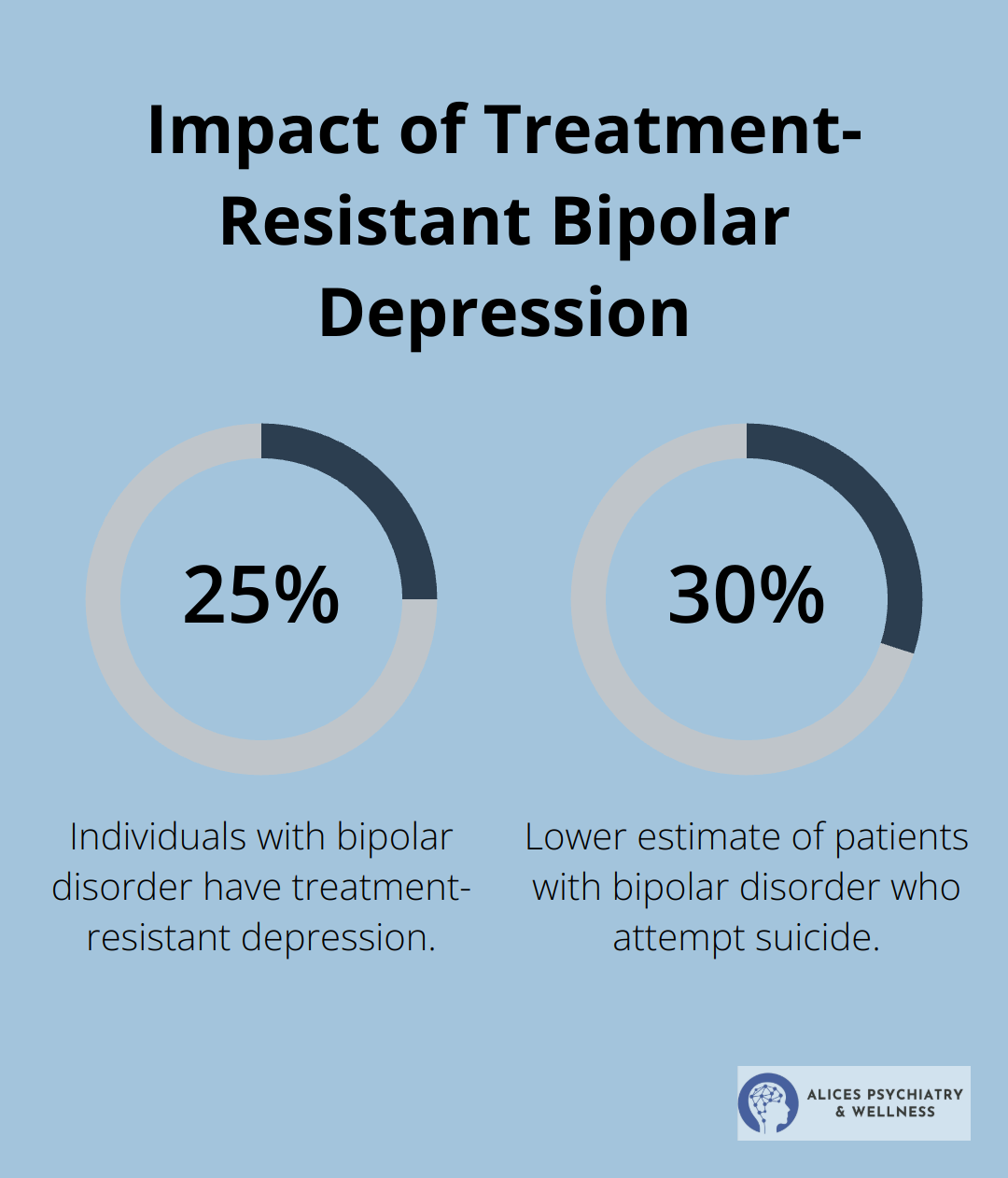At Alice’s Psychiatry and Wellness, we understand the challenges faced by individuals with treatment-resistant bipolar depression. This complex condition can significantly impact a person’s quality of life and functionality.
In this blog post, we’ll explore advanced treatment options and lifestyle approaches that offer hope for those struggling with this persistent form of bipolar depression. Our goal is to provide valuable insights and strategies to help patients and their loved ones navigate this difficult journey.
Understanding Treatment-Resistant Bipolar Depression
Definition and Prevalence
Treatment-resistant bipolar depression affects approximately 25% of individuals with bipolar disorder. This condition persists despite standard treatments, leaving patients to struggle with ongoing symptoms after trying multiple medications.
Factors Contributing to Treatment Resistance
Several elements can lead to treatment resistance in bipolar depression:
- Misdiagnosis: Bipolar depression often masquerades as unipolar depression, resulting in ineffective treatment strategies.
- Comorbid Conditions: Anxiety disorders or substance abuse can complicate treatment and contribute to resistance.
- Medication Non-Adherence: The National Alliance on Mental Illness reports that up to 50% of individuals with bipolar disorder may not adhere to their prescribed medication regimen (often due to side effects or complex dosing schedules).
Impact on Quality of Life
Treatment-resistant bipolar depression profoundly affects a person’s life. Patients frequently experience significant impairment in social and occupational functioning. A study in the Journal of Affective Disorders found that individuals with this condition had lower employment rates and higher disability rates compared to those who responded to treatment.
The risk of suicide also increases significantly in this group. Research indicates that 30-50% of patients with bipolar disorder attempt suicide, with a 15-20% mortality rate.

Comprehensive Evaluation
A thorough evaluation for patients with suspected treatment-resistant bipolar depression should include:
- Detailed medical history
- Assessment of previous treatments
- Consideration of pharmacogenetic testing to optimize medication selection
Addressing lifestyle factors that can impact treatment response is also critical. Research shows that regular exercise can reduce depressive symptoms by up to 50% in individuals with bipolar depression. Incorporating evidence-based lifestyle interventions into treatment plans can enhance overall outcomes.
The Role of Advanced Treatment Options
As we move forward in our discussion, we’ll explore cutting-edge treatment options that offer new hope for those grappling with treatment-resistant bipolar depression. These advanced approaches (including ketamine therapy and transcranial magnetic stimulation) have shown promising results in recent studies and may provide relief where traditional methods have fallen short.
Breakthrough Treatments for Stubborn Bipolar Depression
Ketamine: A Rapid-Acting Solution
Ketamine therapy has shown effectiveness in treating treatment-resistant depression (TRD). This fast-acting medication provides swift relief, often within hours or days, in contrast to traditional antidepressants that may take weeks or months to show effects.
Many patients report significant mood improvements after just a few sessions, offering new hope for those who have struggled with conventional treatments.
Transcranial Magnetic Stimulation: Non-Invasive Brain Modulation
Transcranial Magnetic Stimulation (TMS) presents a non-invasive option for patients who haven’t responded to medication. This FDA-approved treatment uses magnetic fields to stimulate specific brain areas associated with mood regulation.
About 50% of patients respond well to rTMS, with over 30% achieving full remission. Patients often report fewer side effects compared to medication (making it an attractive alternative for those seeking different options).

Electroconvulsive Therapy: Misunderstood Yet Effective
Despite its stigma, Electroconvulsive Therapy (ECT) remains one of the most effective treatments for severe, treatment-resistant bipolar depression. Modern ECT is safe, performed under anesthesia, and can provide rapid relief for patients in crisis.
This treatment can be particularly beneficial for patients with acute suicidal ideation or those who cannot tolerate medication side effects.
Novel Pharmaceutical Approaches
The field of psychiatry continues to evolve with new antidepressants and mood stabilizers that target different neurotransmitter systems. These medications offer hope for patients who haven’t responded to traditional treatments.
Personalized Treatment Plans
A comprehensive approach to treatment-resistant bipolar depression involves combining advanced therapies with lifestyle interventions. This strategy maximizes the chances of long-term success and improved quality of life.
The next chapter will explore complementary approaches and lifestyle modifications that can enhance the effectiveness of these breakthrough treatments, providing a holistic strategy for managing treatment-resistant bipolar depression.
Lifestyle Changes for Better Mental Health
The Power of Sleep
Sleep disturbances often trigger mood episodes in bipolar disorder. The National Sleep Foundation recommends 7-9 hours of sleep per night for adults. To improve sleep quality:
- Follow a consistent sleep-wake schedule (even on weekends).
- Create a relaxing bedtime routine.
- Avoid screens at least an hour before bed.
- Maintain a cool, dark, and quiet bedroom.

Nutrition and Exercise: Fuel for the Mind
A balanced diet and regular physical activity significantly impact mood stability. The Mediterranean diet (rich in fruits, vegetables, whole grains, and lean proteins) links to lower depression rates. Try to engage in at least 30 minutes of moderate exercise five days a week.
Stress Management Techniques
Chronic stress exacerbates bipolar symptoms. Incorporate stress-reduction techniques into your daily routine to manage mood fluctuations. Mindfulness meditation (practiced for just 10-15 minutes daily) reduces anxiety and depressive symptoms. The Headspace app offers guided meditations for bipolar disorder.
Tailored Psychotherapy Approaches
Some psychotherapy modalities prove particularly effective for treatment-resistant cases. Interpersonal and Social Rhythm Therapy (IPSRT) focuses on stabilizing daily routines and improving interpersonal relationships. The clinician helps the patient recognize the relationship between disruptions in social rhythms and the onset of previous episodes.
Cognitive Behavioral Therapy (CBT) adapted for bipolar disorder helps identify and change negative thought patterns. A meta-analysis in the Journal of Affective Disorders showed that CBT reduced relapse rates and improved overall functioning in individuals with bipolar disorder.
Holistic Wellness Strategies
Complementary approaches enhance traditional treatments. Consider these options:
- Yoga and tai chi (for stress reduction and body awareness)
- Acupuncture (to alleviate depressive symptoms)
- Light therapy (especially for seasonal mood patterns)
- Art or music therapy (for emotional expression and stress relief)
These evidence-based lifestyle interventions (when combined with medication management and psychotherapy) form a comprehensive approach to managing treatment-resistant bipolar depression.
Final Thoughts
Treatment-resistant bipolar depression presents significant challenges, but new approaches offer hope. Advanced therapies like ketamine and transcranial magnetic stimulation, combined with lifestyle changes, can make a real difference in symptom management. Personalized treatment plans that integrate medication, psychotherapy, and lifestyle interventions address the unique needs of each individual.
The field of mental health care continues to evolve, promising more effective treatments for treatment-resistant bipolar depression. Patients should work closely with their healthcare providers to find the right combination of therapies and lifestyle changes. At Alice’s Psychiatry and Wellness, we provide compassionate, personalized care for those dealing with this condition.
Our team of experienced mental health professionals offers comprehensive evaluations and tailored treatment plans to help you on your journey to mental wellness. If you struggle with bipolar depression that hasn’t responded to traditional treatments, we’re here to help. With persistence and the right support, it’s possible to find relief and improve your overall well-being.





